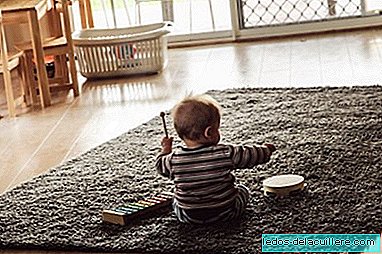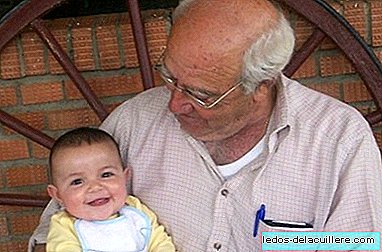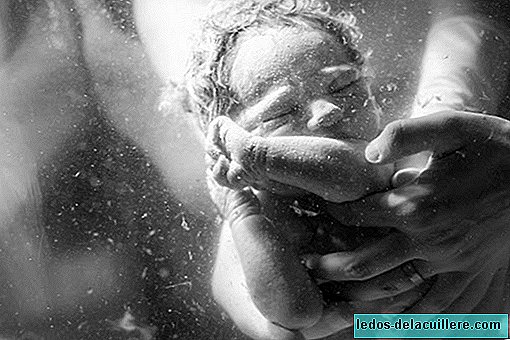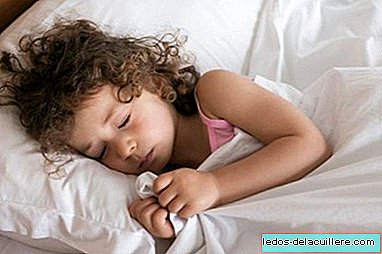
The need to go to daycare or nursery school to favor the socialization of children is a deep-rooted belief, but ... what is true in it? We tell you how the social development of children from birth to preschool age and the role of parents and peers in it.
The social development of children
Broadly speaking, and considering that in terms of development we always talk about age groups, these are some of the characteristics of children's social development:
0 to 3 months
From birth to 3 months the child shows his needs through movements and crying. Smiles may appear in the first month, but it will not be until the second when they are true signs of pleasure. At first they may not hold our eyes much, but little by little they will be holding it, thus initiating their first social interactions that will give way to "proto-conversations". At this stage, they already show satisfaction in being with reference adults (the attachment figure / s) and "know" that we can reassure them and provide what they need.
4 to 7 months
A great change will take place between 4 and 7 months: the children begin to demand our attention very voluntarily, to ask us for help, they smile at us, babble ... Towards the end of this stage, at the moment they remain seated without help and They have their hands free, they can try to get our attention by throwing things, giving some blow ... The world (which is not them) begins to interest them (They may turn their heads if they listen to another child, for example).
8 to 12 months
The child is increasingly "interactive" with us, they play and demand attention and presence. Some discomfort may appear when attachment figures they leave or are not in their sight (which in some cases we would call separation anxiety). They begin to forge their sense of identity, and for example, they are already recognized in the mirror.
1-2 years
We are in a stage that is usually called "egocentric" in the sense that for them the world revolves around them. They want to keep in touch with the attachment figures and play with us. The child knows that there are other people and they are interested in them, but they don't even think about what they feel or think ("everyone thinks the same as me"). They may show interest in other children, especially those who are older than them, and who try imitate them (imitation is one of the main ways of learning). The concept of “sharing” does not make much sense to them, so even if they are in the presence of other children, that of sharing… they still do not handle it and therefore they carry it “a little badly”.
In figures. A study by the universities of Rennes (France) and Liverpool, indicates that between 2 and 3 years 24.4% of children spent more time playing alone, 22.4% playing alone with other children (parallel play), 17% were embarked on associative or cooperative play and 5.3% interacted in some way (no play) with other partners.
 In Babies and more When a mother plays with her baby, her brain activity mimics her son's
In Babies and more When a mother plays with her baby, her brain activity mimics her son's 3-4 years
Around 3-4 years old children pass the game in parallel to the cooperative game, that is, to "play with" and not "next to", they begin to interact more with other children being both involved in the same game context. The collaboration appears and they may tell us that "they have a best friend." They begin to want their friends to come home, want to show their surroundings and make themselves known through their things.

Is nursery essential to socialize correctly?
The reality is that no: In a standard family environment, a child gets in the first years all the stimulation he needs to develop at a social level in a healthy and desirable way.
Yes it is true that there are cases, in socio-depressed families or with difficulties, in which this stimulation is not enough, and therefore it is recommended that the child receives an extra, for example by going to this type of centers. But I insist: most families represent a more than enough context for the development of the child in the first years.
Socialization, the tools that we learn and that we put in place for it are acquired by ages, that is, it is a evolutionary pattern, such as speech or sphincter control, so trying to force the social development of our little one doesn't make much sense.
A study by the NICHD Early Child Care Research Network concludes that the age of entry into school context (nursery or nursery school) is not really related to the child's socio-emotional functioning.
It is advisable to adapt to the needs and advances of the child, understanding that these acquisitions are occurring over time, in age groups (eye, there is no fixed age for each thing, but we always talk about temporary arcs in what to Children's development refers).
Asking a little one year old to understand and know how to handle the removal of a toy is almost impossible, since at that age he does not have evolutionarily the tools necessary to handle the situation. So no matter how much you are with other children, their development is not going to accelerate.
For its part, the Spanish Association of Pediatrics recommends not taking children to daycare before two years, among other things because their immune system is not yet "strong" to deal with such amount and variety of viruses that are around centers

Does this mean that children do not need to be with other children?
At all, children need to interact with other children, with their peers as we call them, to develop in a healthy way. But as we have seen, it is not until a certain age that children participate in the game and the presence of other children.
Between the ages of 3 and 5, children are building their identity, understanding that they are individuals in themselves, and in this process, equals (other children) are key elements. The benefits reported by the interaction with friends are very relevant:
- In this context they have to make decisions and assert their opinion, which favors the acquisition of communication tools, learn to resolve conflicts, etc.
- With his friends the child adopts new roles: he is not "son of", "brother of", but "I", which favors his self-esteem and strengthens his notion of individual (process that, as I said before, is in full construction and that reaches adolescence).
- In addition, with their peers they share ideas, tastes, activities that do not occur with the adults in their family, which is a huge reinforcement and source of satisfaction for them.
 In Babies and more How to help your child adapt to nursery school: these are the tips of the teachers
In Babies and more How to help your child adapt to nursery school: these are the tips of the teachersIn fact, the development of social skills is closely related to emotional development, hence we have been talking about socio-emotional development for some time.
Interaction with peers is important for the socio-emotional development of children, but as we have seen it is not until 3 or 4 years old when they truly begin to interact with each other in a conscious and voluntary way. Until that age parents are the main agents of socialization, which does not mean that it is great that the child is in the presence of other children, in the park, on the street, in recreational spaces ... there are children in many places, not only in nurseries, and all stimulation is welcome.
There are many parents who currently take their children to daycare centers, either because they have no alternative or because they consider it the best. If you are meditating what to do, weigh pros and cons, but bring the issue of benefits over socialization, because you have already seen that it is not essential or necessary for the correct socio-emotional development of your child.
Photos: Pexels.com
In Babies and more: "Just as we do not force walking, we must not force socialization." Interview with psychologist Teresa Garcia












